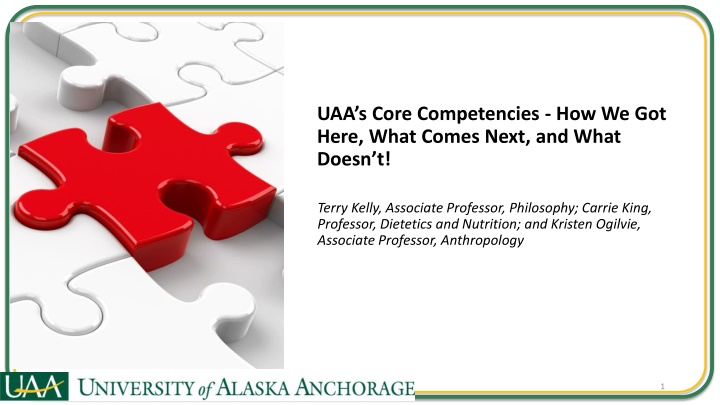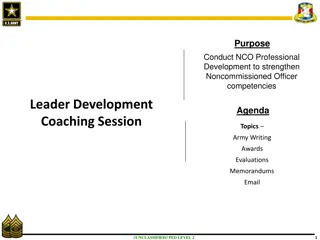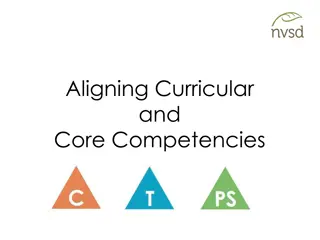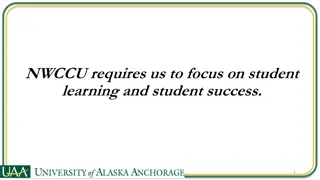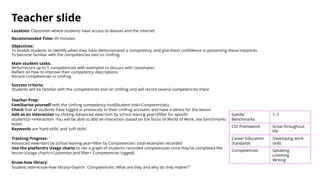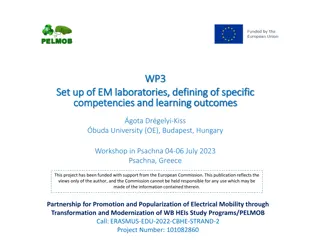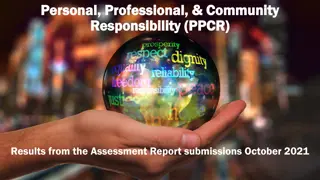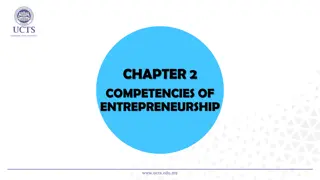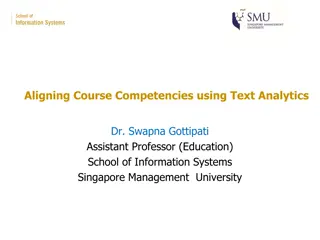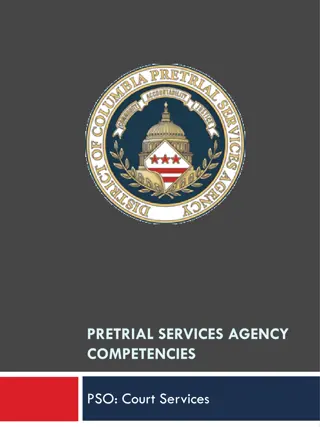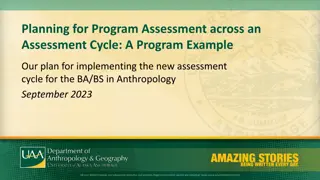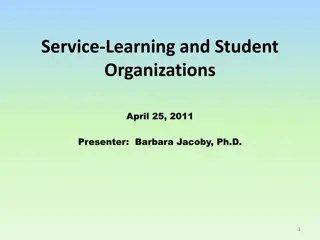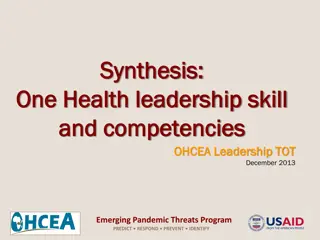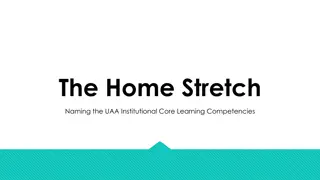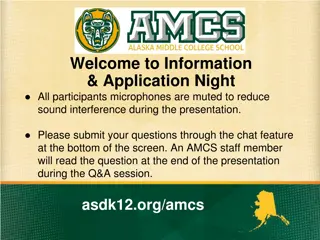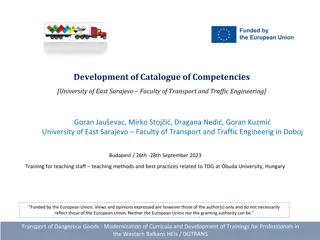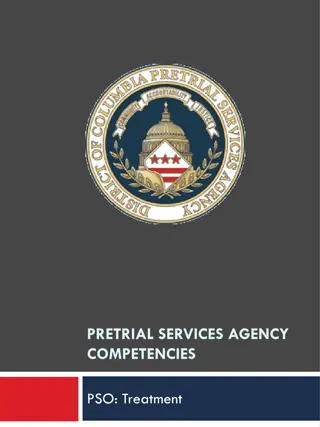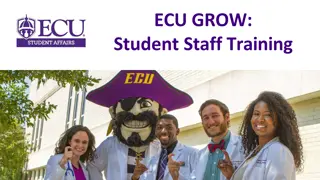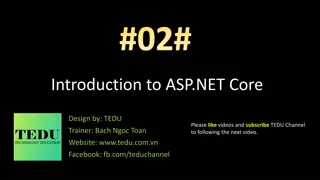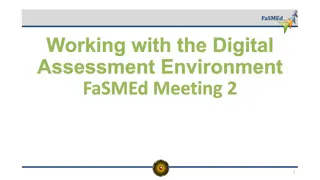UAA Core Competencies: Fostering Student Learning and Success
Explore the essential competencies at the University of Alaska Anchorage (UAA) that aim to promote student learning, alignment of experiences, academic confidence, and a sense of belonging on campus. Learn about the journey of identifying and streamlining core competencies, including effective communication, critical and creative thinking, intercultural fluency, and personal, professional, and community responsibility.
Download Presentation

Please find below an Image/Link to download the presentation.
The content on the website is provided AS IS for your information and personal use only. It may not be sold, licensed, or shared on other websites without obtaining consent from the author.If you encounter any issues during the download, it is possible that the publisher has removed the file from their server.
You are allowed to download the files provided on this website for personal or commercial use, subject to the condition that they are used lawfully. All files are the property of their respective owners.
The content on the website is provided AS IS for your information and personal use only. It may not be sold, licensed, or shared on other websites without obtaining consent from the author.
E N D
Presentation Transcript
UAAs Core Competencies - How We Got Here, What Comes Next, and What Doesn t! Terry Kelly, Associate Professor, Philosophy; Carrie King, Professor, Dietetics and Nutrition; and Kristen Ogilvie, Associate Professor, Anthropology 1
Describe the student learning that we aspire to promote in every UAA student. Curricular, Co-Curricular, Extra-Curricular What are Core Competencies? Reflect and guide the educational culture at UAA Promote alignment of learning experiences across campus Promote academic confidence and a sense of belonging for students 2
2020 NWCCU standards include the identification and assessment of UAA institutional core competencies for student learning. How Did We How Did We Get Here Get Here After a series of open forums and meetings with stakeholders across the UAA community in the Fall we identified 31 competencies. Based on stakeholder feedback, we consolidated the 31 to 9 and then finally to 4 basic competencies.
The knowledge and skills necessary to engage in effective communication in diverse contexts and formats. Effective Effective Communication Communication
The knowledge and skills necessary for the critical exploration of issues, ideas, artifacts, and events in order to creatively design, evaluate, and implement a strategy to answer complex questions or achieve a desired goal. Critical and Critical and Creative Thinking Creative Thinking
The knowledge and skills necessary for effective and appropriate interaction in a variety of cultural contexts, particularly in terms of the diverse populations of Alaska. Intercultural Intercultural Fluency Fluency
The knowledge and skills necessary to promote personal flourishing, professional excellence, and community engagement. Personal, Personal, Professional, and Professional, and Community Community Responsibility Responsibility
Pilot Project: Personal, Professional, and Pilot Project: Personal, Professional, and Community Responsibility (PPCR) Community Responsibility (PPCR) What kind of learning opportunities does your area of UAA create for student learning? Is this an ongoing and intentional opportunity? Is it transparent? How are you or your program/service area designing these opportunities to address equity? 8
Whats Next What s Next Academic Assessment form asks programs to reflect on how they promote the core competencies. Programs will not be asked to assess themselves, or modify their assessment plans, in light of the core competencies (but are free to do so if they wish). Graduate Exit Survey Focus Discussion Groups 9
Student Focus Group Objectives Student Focus Group Objectives The goal of these student focus group assessment activities is to document where and how students develop the core competencies at UAA. We hope to accomplish this by soliciting and analyzing student perspectives on each core competency with a focus on the: Opportunities or experiences available to them related to developing the core competency both at UAA and in their lives outside of the university. Where and when did these experiences occur? Opportunities or experiences not available to them that they believe could have enhanced the development of the core competency or challenges they experienced in meeting the core competency.
Stories are a great complement to other evidence, which is increasingly being recognized in higher education assessment while a lot of data is gathered through assessment, meaning needs to be made of the data. Natasha Jankowski (National Institute for Learning Outcomes Assessment) Inclusion of storytelling and narratives flips the authoritative structures of traditional assessment, putting student voices and perspectives at the fore Indigenous evaluation models call for the inclusion of narratives and stories as a means to reduce implicit bias in evaluation processes and to recognize and value a diversity of opinions Student Student Focus Focus Group Group Rationale Rationale
Student Focus Group Pilot Student Focus Group Pilot Assessment team developed a focus group guide on student development of PPCR Piloted the focus group in Spring 2021 GER Integrative Capstone Course Incredibly insightful
List of Academic Opportunities Gen Ed Courses Communication, Writing, Tier 2 Program Courses Environment & Society, Anthropology Diversity-Focused Courses AKNS, GEOG, ANTH, SOC Community-Engaged Courses Opportunities for hands-on work in community Team-based assignments Discussion-type courses that allow for interaction and diversity of ideas What did we What did we learn from the learn from the students in the students in the pilot student pilot student focus group on focus group on PPCR? PPCR?
List of Other Opportunities What did we What did we learn from the learn from the students in the students in the pilot student pilot student focus group on focus group on PPCR PPCR? ? (2) Student Clubs Future Health Professionals Tutoring Opportunities (leadership building) Intangible skills learned through college interactions/experiences Being around people different than you University-Wide Efforts Academic Honesty on every syllabus Actions of Disability Support Services to create inclusive environment Career Services developing professionalism Handshake was specifically mentioned (2)
COVID-19 has disrupted the processes that many students spoke of (team- based assignments, interactions with others, skill building) Students mentioned you can just get by without engaging in many things and there isn t always a clear path to involvement (especially for students with less experience putting themselves out there) Some students wanted to see more across-the-board inclusion of community-engaged curriculum, every student should see it What did we What did we learn from the learn from the students in the students in the pilot student pilot student focus group on focus group on PPCR PPCR? ? (3) (3)
Student Focus Group Next Steps Student Focus Group Next Steps Revised the guide and process over the summer based on the pilot Also adapting guides for the other three core competencies Seeking IRB approval this month so that we can share this innovative approach with others outside of UAA Plan to train moderators and implement more focus groups this year on both PPCR and effective communication GER capstone courses Key associate s degree courses Other student groups
